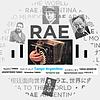
RAE Argentina al Mundo: Argentine Tango (Tango Argentino)
RAE Argentina al Mundo
TANGO is so much more than a musical genre. It's history, passion and feeling. It's integration of culture, distance and generations in one expression, an Argentine sound, that people around the world associate with us and our country.
Tango has got its history, secrets, artists. Past, present and future of a cultural expression declared by UNESCO as Non-Material Cultural Heritage of Mankind.
Every week we introduce a special program about the most important people in Argentine tango. It's a production by Julieta Galván, presented by Mirian Turkula and Fernando Farias.
Luokat: Musiikki
Kuuntele viimeinen jakso:
Homero Manzi, the poet of tango.
Homero Nicolás Manzione Prestera, better known as Homero Manzi (November 1, 1907–May 3, 1951) was an Argentine Tango lyricist, author of various famous tangos.
He was born on November 1 of 1907 in Añatuya (province of Santiago del Estero), Argentina. Manzi was interested in literature and tango since he was young. After a brief incursion in journalism, he worked as a literature and Spanish professor but for political reasons (in addition to his membership in the Unión Cívica Radical) he was expelled from his professorship and decided to dedicate himself to the arts.
In 1935 he participated in the beginnings of FORJA (Fuerza de Orientación Radical de la Joven Argentina – Force of Radical Orientation of the Young in Argentina), group whose position has been classified as “peoples nationalism”. It was centered almost exclusively in the problems in Argentina and Latin America. They manifested to “reconquer the political Sunday from our own land” since it was considered that the country was still in a colonial situation. In relation to the European conflict at the time, it supported a neutral position sustaining that there was no great interest was in play in Argentina or Latin America, it was more of a rejection position towards fascism just as much as communism.[1]
In 1934 Manzi founded Micrófono ("Microphone") magazine which covered subjects related to radio telephony, Argentine movies and film making. He wrote the screenplay for Nobleza Gaucha in 1937 in collaboration with Hugo Mac Dougall, and a new version of the silent movie of 1915, Huella ("Footprint") (1940), for which they received second prize from Buenos Aires City Hall. He also worked in Confesión ("Confession") (1940), without achieving commercial success with any of these movies.[2]
In 1940 Manzi started what would be a long collaboration with Ulyses Petit de Murat, writing the screenplay for Con el dedo en el gatillo ("Finger on the trigger") (1940) Fortín alto ("High Fort") (1940), and The Gaucho War (1942). At the 1943 Argentine Film Critics Association Awards, Manzi and Murat won the Silver Condor Award for Best Adapted Screenplay for their screenplay of The Gaucho War which proved highly successful.[3]
The early death of the poet was caused by cancer on Thursday, May 3, 1951.
Tango Lyrics by Homero Manzi
Arrabal Milonga
Así Es El Tango
Ay De Mí
Bandoneón Amigo
Barrio De Tango (1942), music by Anibal Troilo.
Betinotti (1938), music by Sebastian Piana.
Borracho Porque Digo La Verdad
Buenos Aires Colina Chata
Canto De Ausencia
Carnavalera
Che Bandoneon (1950), music by Anibal Troilo.
Cornetín
Dale Dale
Definiciones Para Esperar Mi Muerte
Desde El Alma (vals)
Despues (1937), music by Hugo Gutierrez.
De Ayer A Hoy
De Barro
Discepolín (1950), music by Anibal Troilo.
El Pescante (1934), music by Sebastian Piana.
El Romantico Fulero
El Último Organito (1948), music by Acho Manzi.
Ensueño (vals)
En Un Ranchito De Alsina - Nobleza De Arrabal
Esquinas Porteñas (vals)
Eufemio Pizarro
Fruta Amarga
Fueye
Fuimos (1945), music by Jose Dames.
Gato
Gota De Lluvia (vals)
Horizontes
Juan Manuel
La Mariposa Y La Flor Tango Canción
La Pequeña Canción
Llanto
Llorarás, Llorarás (vals)
Malena (1941), music by Lucio Demare.
Mano Blanca (1939), music by Antonio de Bassi.
Mariana Milonga
Mañana Zarpa Un Barco (1942), music by Lucio Demare.
Milonga Del 900
Milonga De Los Fortines
Milonga De Puente Alsina
Milonga Sentimental (1932), music by Sebastian Piana.
Milonga Triste (1937), music by Sebastian Piana.
Milongón
Mi Taza De Café
Monte Criollo (1935), music by Francisco Nicolas Pracanico.
Muchacho Del Cafetin
Negra María...
Aikaisemmat jaksot
-
12 - 06 Homero Manzi, the poet of tango.Tue, 21 Mar 2017
-
11 - 05 Enrique Santos DiscepoloSun, 12 Mar 2017
-
10 - 04 Rosita Quiroga , woman in the TangoWed, 25 Jan 2017
-
9 - 03 Anibal Troilo, Buenos Aires' Principal Bandoneon player.Wed, 16 Nov 2016
-
8 - 02 Astor Piazzolla or tango's revolutionWed, 16 Nov 2016
-
7 - 01 Carlos Gardel's early yearsWed, 16 Nov 2016



















![[KBS] 박명수의 라디오쇼](https://is1-ssl.mzstatic.com/image/thumb/Podcasts123/v4/d9/ee/1d/d9ee1d39-603c-2f10-a642-3d3e8a898a0c/mza_5623237839987832374.jpg/150x150bb.jpg)



